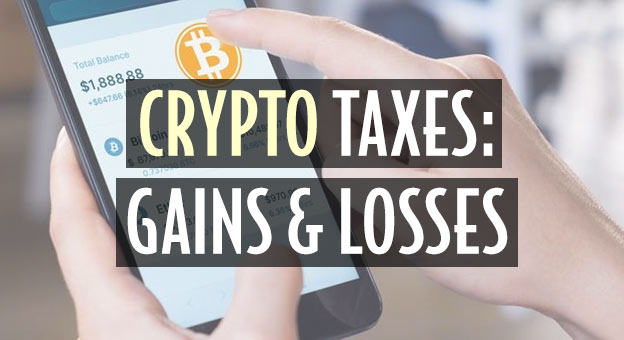Ah, 2021.
Britney was finally freed, we binge-watched Squid Game, and Kim and Kanye called it quits. But more importantly, by the end of the year, there were almost 300 million crypto users worldwide.
In fact, one study found that the number of Americans who own crypto is now higher than the number of Americans with savings accounts!
So, it’s no secret that Crypto investing has exploded. And while people are eagerly taking the plunge, it’s important to remember that Crypto, like any currency, is subject to taxation. (And, speaking of plunge, a lot of people lost money on crypto this tax year!)
So as we hurdle towards the April 15th tax deadline, let’s take a look at how to report capital gains or losses from crypto trading, staking, or mining on your tax return.
Crypto taxes: Trading | Mining | Staking
Taxes: Crypto Trading
Starting in 2020, the IRS added this question to page one of form 1040:
“At any time during the tax year, did you receive, sell, send, exchange, or otherwise dispose of any financial interest in any virtual currency?”
If the answer is, “yes,” you’ll want to know how crypto is taxed.
Bitcoin, Ethereum, and other Crypto holdings are considered “property” by the IRS, so the gains and losses are taxed like any other asset, such as gold and stocks.
Like other assets, Crypto’s taxable value will be based on gains and losses. If you just purchased Crypto with cash, then you don’t need to worry about paying taxes on that transaction. However, once you start selling cryptocurrencies, they become taxable.
There are 3 key things that matter for crypto taxes:
- Capital gains
- Losses
- How long you’ve owned the Crypto
Capital Gains: Let’s say you bought $200 worth of Bitcoin and then sold it for $600, your capital gains would be $400.
Crypto losses: If your Bitcoin lost value from the purchase, you would file that as a loss. If at the end of the year, your crypto losses outweigh your gains, you can deduct up to $3000 from your taxable income.
Length of Ownership: There are long-term capital gains and short-term capital gains on crypto. Generally speaking, if you owned your Bitcoin for more than a year, that would be considered a long-term capital gain. How long you’ve held the Crypto, along with your other taxable income, can affect your tax rate.
However, if you bought and then sold your Bitcoin within that year, then you’re looking at a short-term capital gain. Short-term gains are taxed just like ordinary income.
So, what tax forms do you need for crypto sales?
- Reconcile your crypto gains and losses using Form 8949
- Report these gains or losses on Form 1040 Schedule D
- Anyone who has more than 200 transactions and more than $20,000 in crypto trades for the year must file a 1099K
*Sound complicated? TurboTax makes reporting crypto income or losses a snap. Here’s a coupon!
Taxes: Crypto Mining
As you probably know, crypto “mining” involves using a computer or crypto rig to do the complex computational work that produces the reward of crypto tokens.
So, how is crypto mining taxed?
“When a taxpayer successfully mines virtual currency, the fair market value
of the virtual currency as of the date of receipt is includible in gross income.” – IRS.gov
Mined crypto or crypto received as a payment for goods or services is taxed as part of your regular income. Your regular income rate will determine how much tax you will owe. If you keep some of the Crypto that you mine, and it either increases in value or you sell it at a profit, that will also owe capital gains taxes in addition to the taxes owed from mining it.
Forms Needed
- Form 8949 (To report the purchase and sale of any Crypto you’ve mined and sold, plus any gains and losses that resulted from those transactions)
- Schedule D (Summarizes your gains and losses)
- Schedule C This form will disclose if the coins you’ve received through mining were received as a hobby or as a business. Important: If you’re mining as a business, you might also owe self-employment taxes!
- If Mining Cryotp is a hobby then you will report that on Line 8 of Schedule 1.
Tip: If you mine crypto as a hobby or business, you can write off certain expenses against your income like computers, servers, electricity, and the internet.
If you mine crypto as a hobby, you won’t need to file self-employment taxes, but it will limit what you can then deduct as an expense.
Taxes: Crypto Staking
Crypto mining requires a lot of electricity! In fact, in 2021 bitcoin mining used more electricity than a number of countries including Finland!
For this reason, “staking” has become an environmentally-friendly alternative to mining. Staking doesn’t require much electricity at all and is simply the process of locking up your crypto holdings in order to earn rewards or interest.
Think of staking as earning interest from the money you have parked in a savings account.
So, how are capital gains from crypto staking taxed?
Things change quickly in the world of crypto, and the IRS doesn’t have specific guidance for crypto staking yet. However, as far as taxation, think of crypto staking rewards as “property” reported on your 1099-MISC form.
Tip: Based on current IRS guidance, virtual currency is treated as property for federal income purposes, so the tax principles that apply to the property are applicable to transactions using crypto
So, while crypto rewards from staking are currently taxed as property, a lot of taxpayers who stake crypto don’t think that’s fair. In fact, let’s look at the case of Jarrett v. United States to see how taxes on crypto staking are evolving.
Taxes on Crypto Staking: Jarrett v. United States:
A taxpayer recently filed a refund suit against the IRS for the taxes that he paid on his Tezos crypto staking (“baking”) rewards. He argued that because he had not sold the earned crypto, he should not have to pay taxes on it yet.
In fact, Jarrett claimed that the crypto rewards are like property and compared himself to a baker. Why should a baker pay taxes on cakes that he hasn’t sold yet?
Actually, he makes a very good point, and as you can see, the IRS has a lot of catching up to do in their guidance for crypto and taxes.


